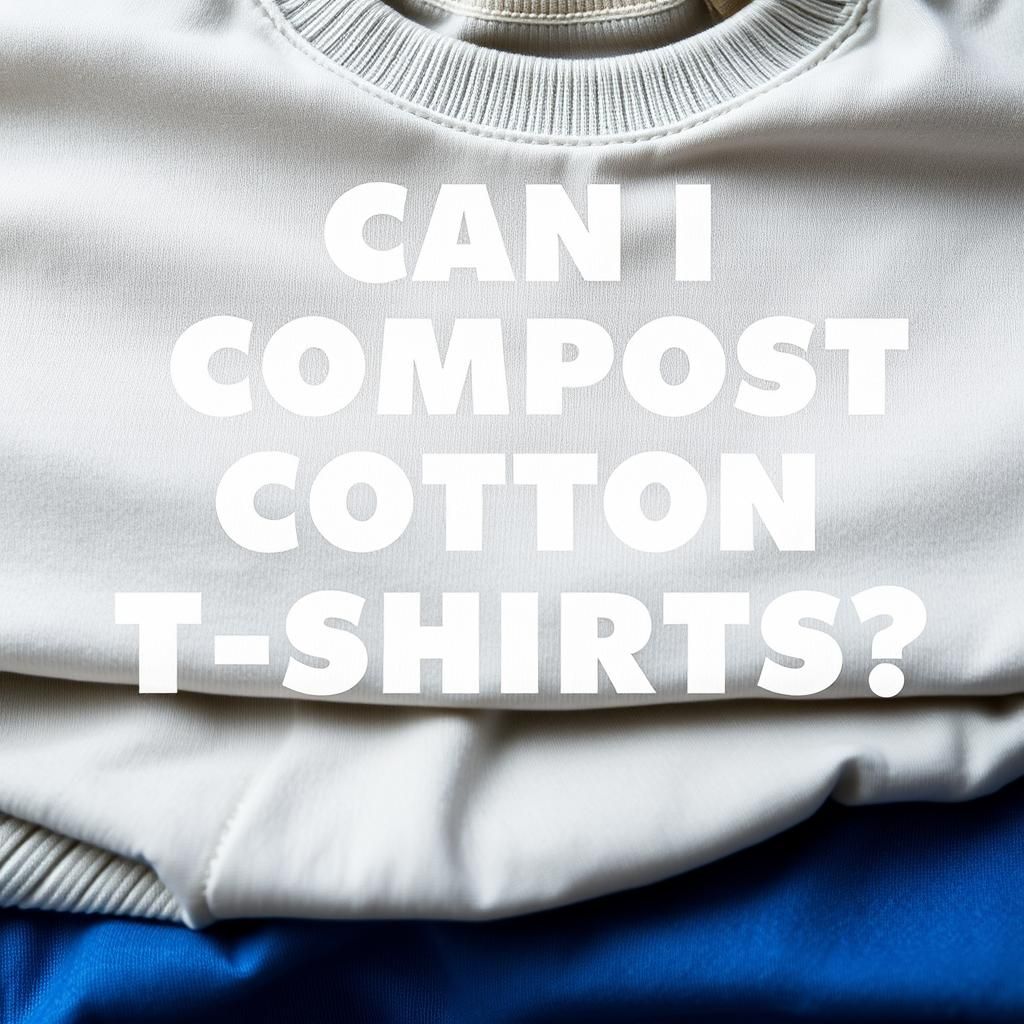Can I Compost Cotton T-Shirts? A Complete Guide to Eco-Friendly Disposal

In an era where environmental awareness is crucial, many people are seeking sustainable ways to dispose of their belongings, including clothing. Cotton T-shirts, a staple in many wardrobes, often end up in landfills, contributing to pollution and waste. But what if there was a more eco-friendly option? This article explores the ins and outs of composting cotton T-shirts, providing a comprehensive guide for those who want to make a positive impact on the planet. From understanding the composting process to tips on preparation, we’ll help you determine whether your old T-shirts can find new life in your compost pile.
Can I Compost Cotton T-Shirts?
Yes, you can compost cotton t-shirts, as long as they are made from 100% cotton and do not contain synthetic materials such as polyester or spandex. Since cotton is a natural fiber, it will break down over time and contribute to the organic content of your compost pile. However, it is essential to ensure that any dyes or prints on the t-shirt are eco-friendly and free from harmful chemicals, as these could affect the quality of the compost. Cutting the t-shirt into smaller pieces can help speed up the decomposition process, allowing the fabric to integrate better with other compostable materials.
Benefits of Composting Cotton T-Shirts
Composting cotton t-shirts can greatly benefit your garden and the environment. By recycling these garments, you help reduce waste in landfills and promote the circular economy of materials. As the t-shirt decomposes, it adds valuable nutrients back into the soil, improving its structure and enhancing its ability to retain moisture. This practice also lowers your carbon footprint by decreasing the demand for new cotton production, which often involves substantial water and pesticide use.
How to Prepare Cotton T-Shirts for Composting
To prepare cotton t-shirts for composting, start by ensuring they are made of 100% cotton without any synthetic blends. Remove any non-biodegradable components, such as buttons or zippers. It helps to cut the t-shirts into smaller pieces to accelerate the composting process. Additionally, if there are any prints or dyes, it's crucial to verify that they are biodegradable and free from harmful chemicals, to ensure they do not leach into the compost.
What to Avoid When Composting Cotton T-Shirts
When composting cotton t-shirts, avoid those made from mixed materials, such as cotton blends with synthetic fibers, as they will not break down and could contaminate the compost. Additionally, steer clear of t-shirts that have been treated with harsh chemicals or contain non-biodegradable prints. It's also advisable not to compost any clothing items with excessive dirt or oils, as these could attract pests and delay the composting process.
See also:
How Long Does it Take for Cotton T-Shirts to Decompose?
The decomposition rate of cotton t-shirts can vary based on environmental conditions such as moisture, temperature, and aeration. Generally, it may take anywhere from several weeks to a few months for 100% cotton t-shirts to decompose fully in a compost environment. The process can be expedited by cutting the fabric into smaller pieces, ensuring adequate moisture levels, and regularly turning the compost to maintain aeration and promote microbial activity.
Alternatives to Composting Cotton T-Shirts
If you are unable to compost cotton t-shirts, several alternatives can help minimize waste. Donating gently used garments to charity organizations or thrift stores allows them to find new homes. You can also consider repurposing the fabric into cleaning rags, tote bags, or craft projects, which can extend the life of the material. Recycling textile programs in your area may accept worn-out clothing to be processed and converted into new products, further reducing landfill waste.
| Material | Compostable? | Notes |
|---|---|---|
| 100% Cotton | Yes | Ensure no synthetic blends or harmful dyes. |
| Cotton Blends | No | Contains non-biodegradable materials. |
| Chemically Treated Cotton | No | Could contaminate the compost. |
Understanding the Compostability of Cotton T-Shirts
When considering whether you can compost cotton T-shirts, it's essential to understand that while cotton is a natural fiber, its ability to break down in a compost pile depends on several factors. 100% cotton T-shirts can generally be composted, as they are biodegradable and, under the right conditions, will decompose over time. However, any prints, dyes, or synthetic blends present in the fabric may hinder the composting process. To ensure effective decomposition, it’s best to cut the shirt into smaller pieces and remove any non-biodegradable components, allowing for quicker breakdown and contributing positively to your compost pile.
Benefits of Composting Cotton
Composting cotton T-shirts offers numerous environmental benefits. By diverting these materials from landfills, we can significantly reduce waste and greenhouse gas emissions. As cotton decomposes, it contributes nutrients back into the soil, improving overall soil health and promoting beneficial organisms. This process enhances soil structure, helps retain moisture, and supports a thriving ecosystem, making composting an effective strategy for sustainable waste management.
How to Prepare Cotton T-Shirts for Composting
To effectively compost cotton T-shirts, start by removing any non-biodegradable elements, such as buttons or zippers. Then, cut the fabric into small pieces to increase surface area, allowing microorganisms to break it down more efficiently. It’s advisable to mix the cotton pieces with other compost materials, like kitchen scraps or dry leaves, to create a well-balanced compost mixture. This mixture will enhance microbial activity and expedite the decomposition process, leading to rich compost.
See also:
What to Avoid When Composting Cotton T-Shirts
While cotton is generally compostable, avoid composting T-shirts that have been treated with chemical finishes, synthetic fibers, or heavily printed designs, as these can introduce toxins into your compost. It's also crucial to refrain from adding stained or heavily soiled shirts, as they may contain residues that could affect the quality of the finished compost. To ensure the health of your compost, always prioritize clean, untreated cotton fabrics.
Composting Alternatives for Cotton T-Shirts
If your cotton T-shirts are not suitable for composting, consider alternative eco-friendly disposal methods. You could donate gently used shirts to charities or thrift stores, which can extend the life of the clothing. Alternatively, you might repurpose the fabric into cleaning rags, tote bags, or other crafts. These alternatives not only reduce waste but also contribute to a circular economy by giving the material a new purpose.
Understanding the Composting Process
The composting process is a natural decomposition of organic materials aided by microorganisms and environmental factors such as moisture, temperature, and aeration. In a compost pile, cotton T-shirts will typically break down within a few months, depending on the size and conditions of the pile. Maintaining the right moisture level and turning the pile regularly will encourage the microorganisms to thrive and speed up the process. Understanding these dynamics is essential to achieving high-quality compost from your cotton waste.
Questions from Our Readers
Can I compost 100% cotton t-shirts?
Yes, you can compost 100% cotton t-shirts as they are made from a natural fiber. When composting them, it's essential to cut them into smaller pieces to accelerate the decomposition process. However, ensure that the t-shirts are not treated with any synthetic dyes or chemicals, as these could harm your compost.
What about cotton t-shirts with prints or dyes?
Cotton t-shirts that have prints or synthetic dyes should generally be avoided in composting, as these substances may not break down properly. It's best to remove any plastic or synthetic embellishments before composting to maintain the quality of your compost, as they can introduce harmful substances.
See also:
How long does it take for cotton t-shirts to decompose in compost?
The decomposition time for cotton t-shirts in compost can vary, but typically, they can take anywhere from a few weeks to several months to break down completely. To speed up the process, ensure your compost is well-aerated and contains a balance of green and brown materials.
Can I compost other clothing items made of cotton?
Yes, you can compost other clothing items made of 100% cotton; just follow the same guidelines as with t-shirts. Be cautious with items containing synthetic blends or non-biodegradable elements, as they may hinder the composting process and affect the overall quality of your compost.

If you want to read more articles like Can I Compost Cotton T-Shirts? A Complete Guide to Eco-Friendly Disposal, we recommend you check out our Compost category.
Leave a Reply
Related Articles